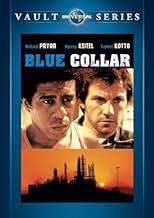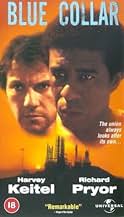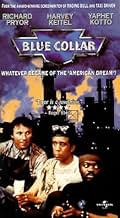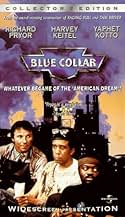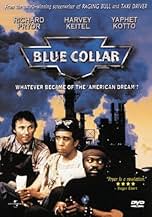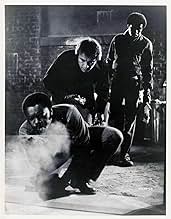CALIFICACIÓN DE IMDb
7.5/10
12 k
TU CALIFICACIÓN
Cuando tres trabajadores intentan robar al sindicato local, en su lugar descubren la corrupción y deciden usar esta información para chantajear.Cuando tres trabajadores intentan robar al sindicato local, en su lugar descubren la corrupción y deciden usar esta información para chantajear.Cuando tres trabajadores intentan robar al sindicato local, en su lugar descubren la corrupción y deciden usar esta información para chantajear.
- Dirección
- Guionistas
- Elenco
- Premios
- 1 premio ganado y 2 nominaciones en total
- Dirección
- Guionistas
- Todo el elenco y el equipo
- Producción, taquilla y más en IMDbPro
Opiniones destacadas
This 1978 Universal release is one of raunchy comedian Richard Pryor's best films and it's a highly serious drama. Pryor successfully goes for a major change of pace in this tale of a trio of auto assembly workers (Pryor, Harvey Keitel, Yaphet Kotto) who are all having some major home, work and family problems and how they decide to solve them by developing a scheme to rob the union for which they work. When they put their plan to work, things eventually go from bad to worse. It may sound like a crime comedy caper with Pryor portraying his usual con man role but it's far more serious than that and Pryor proves that he doesn't have to get laughs in order to deliver a good film performance.
"Blue Collar" opens with a masterful title sequence which introduces us, quickly and effectively, to the harsh world our characters reside in and to the nature of the conditions in the factory they work in. The opening sequence is set to Jack Nitzsche's "Hard Workin' Man", introducing blues music to us right off the bat, music that not only makes up basically all of the music in this film but can be seen as a motif or even a character in the film.
It's amazing how confident and mature Paul Schrader is as a director at this point. Of course, Schrader had already written the massively acclaimed "Taxi Driver" by 1978, but contrary to what one might expect it's his confident and sure handling of the pace and mood in "Blue Collar" that is truly the highlight of the film, not the screenplay penned by Paul and Leonard Schrader, granted the screenplay is in itself quite terrific. Schrader is already a mature director who understands the rhythm of a film.
Going back to the use of music in this film, it isn't so much the score itself by Jack Nitzsche (which is, don't get me wrong, solid blues) that's impressive, it's Schrader's handling of the music and sound in general in this film that makes it work so well. First off, the choice to go with a blues score is inspired in itself, as the nature of the music so perfectly captures what these characters are going through. In addition, the score is most noticeable during scenes where the film appears to be commenting on the futility of the characters' struggle and the misery of what they're going through. Where many films would use music to 'enhance' big, dramatic scenes, Schrader's "Blue Collar" makes the wise decision to use it during low-key scenes. There are several scenes that don't feature any music at all, these being some of the more important scenes. Note the scene where Smokey gets trapped in the paint room, absolutely no music, just the cold sound of the machinery (expertly mixed, might I add), which is far creepier and more effective than any score could be at that point. Similar use of sound occurs a few minutes before the end when Harvey Keitel's character Jerry is being chased.
The acting here is uniformly superb with Keitel possibly giving his best performance (or at least one of them), and Richard Pryor offering what must be recognized as one of the finest performances of the 70's by anyone. Really, who knew Pryor had this sort of skill when it comes to dramatic acting? Yapphet Koto, a beloved character actor, does a fine job in rounding out the cast for the main three characters. Again, Schrader must be credited for directing his actors so well. It's well-known, of course, that the three leads hated each other and actually broke out in fistfights between takes on occasion. Perhaps that created a sort of demented chemistry between them.
The screenplay by Schrader and Schrader (Paul and Leonard) is a fine, fine piece of writing, sort of the daytime factory-worker version of the crude-yet-poetic "Taxi Driver" screenplay. Oddly enough, it's also the source of the few major flaws in this film, as it can come across as fairly heavy-handed in certain scenes. If there's one thing I'd definitely do differently with this film, it's the final shot, which would have been terrific had this been a comedy.
All in all, a great film in its own right and especially impressive as a directorial debut from Schrader. Very memorable.
9/10
It's amazing how confident and mature Paul Schrader is as a director at this point. Of course, Schrader had already written the massively acclaimed "Taxi Driver" by 1978, but contrary to what one might expect it's his confident and sure handling of the pace and mood in "Blue Collar" that is truly the highlight of the film, not the screenplay penned by Paul and Leonard Schrader, granted the screenplay is in itself quite terrific. Schrader is already a mature director who understands the rhythm of a film.
Going back to the use of music in this film, it isn't so much the score itself by Jack Nitzsche (which is, don't get me wrong, solid blues) that's impressive, it's Schrader's handling of the music and sound in general in this film that makes it work so well. First off, the choice to go with a blues score is inspired in itself, as the nature of the music so perfectly captures what these characters are going through. In addition, the score is most noticeable during scenes where the film appears to be commenting on the futility of the characters' struggle and the misery of what they're going through. Where many films would use music to 'enhance' big, dramatic scenes, Schrader's "Blue Collar" makes the wise decision to use it during low-key scenes. There are several scenes that don't feature any music at all, these being some of the more important scenes. Note the scene where Smokey gets trapped in the paint room, absolutely no music, just the cold sound of the machinery (expertly mixed, might I add), which is far creepier and more effective than any score could be at that point. Similar use of sound occurs a few minutes before the end when Harvey Keitel's character Jerry is being chased.
The acting here is uniformly superb with Keitel possibly giving his best performance (or at least one of them), and Richard Pryor offering what must be recognized as one of the finest performances of the 70's by anyone. Really, who knew Pryor had this sort of skill when it comes to dramatic acting? Yapphet Koto, a beloved character actor, does a fine job in rounding out the cast for the main three characters. Again, Schrader must be credited for directing his actors so well. It's well-known, of course, that the three leads hated each other and actually broke out in fistfights between takes on occasion. Perhaps that created a sort of demented chemistry between them.
The screenplay by Schrader and Schrader (Paul and Leonard) is a fine, fine piece of writing, sort of the daytime factory-worker version of the crude-yet-poetic "Taxi Driver" screenplay. Oddly enough, it's also the source of the few major flaws in this film, as it can come across as fairly heavy-handed in certain scenes. If there's one thing I'd definitely do differently with this film, it's the final shot, which would have been terrific had this been a comedy.
All in all, a great film in its own right and especially impressive as a directorial debut from Schrader. Very memorable.
9/10
7tavm
Richard Pryor, Harvey Keitel, and Yaphet Kotto give compelling performances in the drama Blue Collar
After years of reading about this Paul Schrader drama, I finally watched Blue Collar on Netflix Streaming. It stars Richard Pryor, Harvey Keitel, and Yaphet Kotto as three auto assembly workers who feel let down by their bosses and the union rep they don't trust. While Pryor does have some comic moments, he's allowed to be more serious when the film takes a route that challenges these three friends' loyalty to each other. Keitel and Kotto are also very compelling especially when the story concerns the latter's fate. And the score by Jack Nitzsche and Ry Cooder really pours the blues on. So on that note, I recommend Blue Collar. By the way, having noticed that the movie is produced by Norman Lear's company of T.A.T. Communications, he certainly wasn't above plugging his shows "The Jeffersons" and "Good Times" by putting some long clips in when the characters are watching television!
This is a great film. I knew little about it going in, other than it was supposed to be a very well done, searing drama (this according to several film books, including Leonard Maltin's yearly tomes). I was not disappointed. Paul Schrader - writer of "Taxi Driver," "Raging Bull," and writer/director of "Affliction" - delivers yet another gritty, working-class drama. But the film is not without liberal doses of humor, provided chiefly by Richard Pryor in what I consider to be the best performance of his career. C'mon, people! How can you go wrong with Pryor, Harvey Keitel, and Yaphet Kotto (answer: you can't). The films hooks you right from the great opening credit sequence and doesn't let go 'til the final freeze-frame. I won't give the twists and turns of the plot away, but the film centers on three desperate Detroit auto workers and their corrupt union. It's very disappointing this film is so overlooked today (it also flopped when released)... the level of acting and direction (this was Schrader's directorial debut) is astonishing. See this movie!
Three workers in a car plant take it onto themselves to rob the safe of their Union office. They come away with only $600 but they find themselves with information that they can use to blackmail the union. However the union plans to kill the men and turn them against each other.
From the writer of Taxi Driver comes this tough little social piece about how the working man is screwed by the `system'. The plot follows three men trying to make out (admittedly illegally) and the way the system uses them against each other etc to shut them up. The plot is very clever and the writing is superb.
Pryor is great he could have been his comedy self but his acting is really sublime. Likewise Keitel and Kotto are on top form and the support from Begley et al is really good. The film will engross you and the final shot and line will stay with you for years.
Overall an underrated classic that deserves as many viewers as possible.
From the writer of Taxi Driver comes this tough little social piece about how the working man is screwed by the `system'. The plot follows three men trying to make out (admittedly illegally) and the way the system uses them against each other etc to shut them up. The plot is very clever and the writing is superb.
Pryor is great he could have been his comedy self but his acting is really sublime. Likewise Keitel and Kotto are on top form and the support from Begley et al is really good. The film will engross you and the final shot and line will stay with you for years.
Overall an underrated classic that deserves as many viewers as possible.
¿Sabías que…?
- TriviaIt was a very tense shoot, because Richard Pryor, Yaphet Kotto, and Harvey Keitel argued constantly. There were fights, verbal abuse, walk-offs, and Mexican stand-offs. According to Paul Schrader, Pryor punched Keitel and hit Kotto with a chair during filming.
- ErroresWhenever the actors use air powered tools, the tools just spin in mid-air.
- Citas
[last lines]
Smokey James: [voiceover echoing earlier line] They pit the lifers against the new boy and the young against the old. The black against the white. Everything they do is to keep us in our place.
- ConexionesFeatured in At the Movies: Special Show: At the Cassette Store, Part 3 (1986)
- Bandas sonorasHard Workin Man
Music by Jack Nitzsche
Lyrics by Jack Nitzsche, Ry Cooder and Paul Schrader
Performed by Don Van Vliet (as Captain Beefheart)
Selecciones populares
Inicia sesión para calificar y agrega a la lista de videos para obtener recomendaciones personalizadas
- How long is Blue Collar?Con tecnología de Alexa
Detalles
Taquilla
- Presupuesto
- USD 1,700,000 (estimado)
- Total en EE. UU. y Canadá
- USD 6,521,083
- Total a nivel mundial
- USD 6,521,083
Contribuir a esta página
Sugiere una edición o agrega el contenido que falta

Principales brechas de datos
By what name was Blue Collar (1978) officially released in India in English?
Responda


